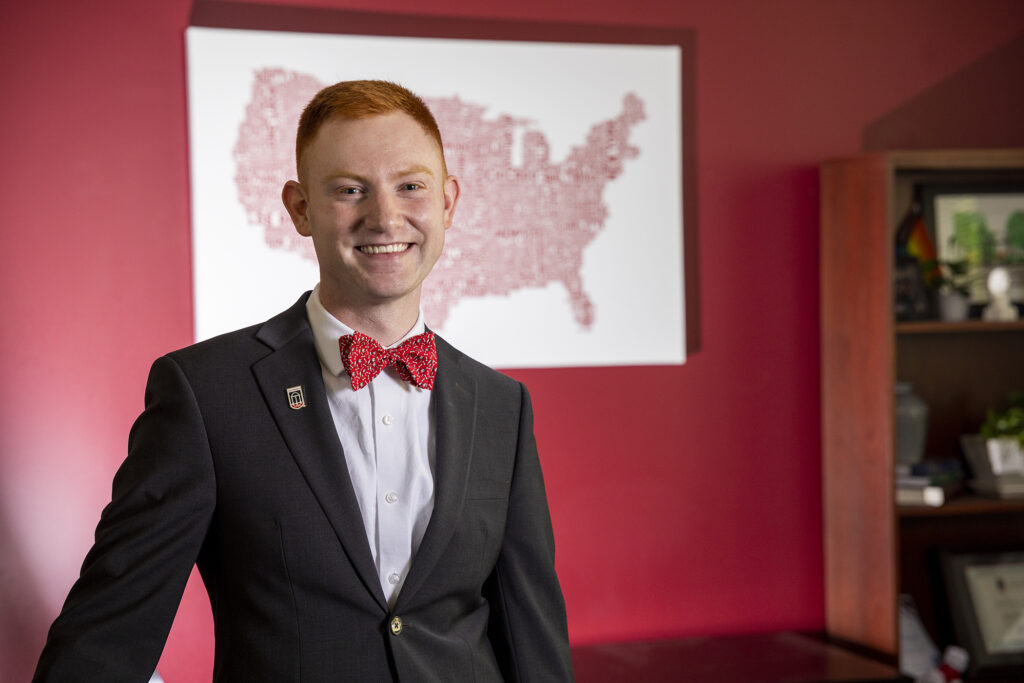Marshall Williams knows when he’s struck the right chord with his students.
As director of admissions for the Hugh Hodgson School of Music in the Franklin College of Arts and Sciences, Williams not only recruits students, but also helps guide them through their time at the University of Georgia.
“I really value students’ mental health and well-being,” he said. “I want students to feel supported and know that they’re not alone in the experiences they’re dealing with in this environment and that there are resources to support them. I want students to know that there is a space here for them and that they belong.”
Williams is a musician himself. Music became part of his life at an early age, and he earned a master’s degree in choral conducting from UGA in 2019 after getting his bachelor’s degree in music education from East Carolina University in 2016. He’s currently pursuing a Doctor of Philosophy in college student affairs administration in the Mary Frances Early College of Education. The doctoral program has given him opportunities to improve his work with students and to integrate his interests of music into his research.
“I aspired to be at this institution and knew the level of quality in the School of Music and the university as a whole,” he said.
Before coming to UGA, Williams was a choral director and piano teacher in eastern North Carolina. His bachelor’s program gave him experience working with students, which fostered his love for both music and higher education. That extended to his master’s program, where he gained experience recruiting students for choirs and engaging with college students. A few months after getting that degree, he landed his current role.
“I thoroughly enjoyed the work that went into building the programs, organizing and developing initiatives and goals, and connecting with students and faculty,” he said. “It’s been a great fit.”
Williams points out that the admissions process for the School of Music is unique in that students must apply and audition for music study at the same time as they are applying for admission to the university.
“What’s great about that is we’re able to get them engaged with our community really early on in the process. It helps to establish a sense of belonging, which is so critical for finding their place in a higher education environment,” he said. “We have that privilege of being able to work with prospective students while they’re navigating the admissions process for the university.”
Undergraduate students Bianca Wilson, left, and Trey Heaton, right, chat with Marshall Williams, center, in the Hugh Hodgson School of Music building. (Photo by Dorothy Kozlowski/UGA)
Williams said that the application and audition process has continued to improve over the years, including some of the advances of technology that came out of the COVID-19 pandemic. As he continues to assess the music admissions and recruitment practices, he hopes to identify ways to increase college access.
Williams spends a good amount of his time in the fall on recruitment. He visits school systems, attends college fairs and invites prospective students to campus to give them the opportunity to interact with the school’s students and faculty. He also works with the school’s roughly 30 student ambassadors, a group of undergraduate music students who serve as leaders for the school and connect with prospective students.
Williams meets with current and potential students, collaborates with UGA admissions and coordinates with the student ambassadors on an ongoing basis. But his favorite part of the job is getting to see the applicants in person and showcasing the School of Music during audition days.
Over the past several years, Williams has been working with the Atlanta Music Project, an organization that serves to provide music opportunities in under-resourced communities. This partnership has highlighted one of the goals of the School of Music—to help students understand that they can continue their involvement in music, regardless of their intended program of study.
When he’s not working with students or completing his own coursework, Williams enjoys spending time outdoors with his dog Toby, checking in on loved ones and completing home improvement projects. That time allows him to relax and reflect throughout his busy schedule.
“The numbers matter, and that is important. But more important are the relationships that can be built, whether it’s me and prospective students, me and other faculty and staff, or current students and prospective students,” he said. “We’ll do the numbers as usual each year, but the question becomes how can we increase the quality of everyone’s experiences?”
